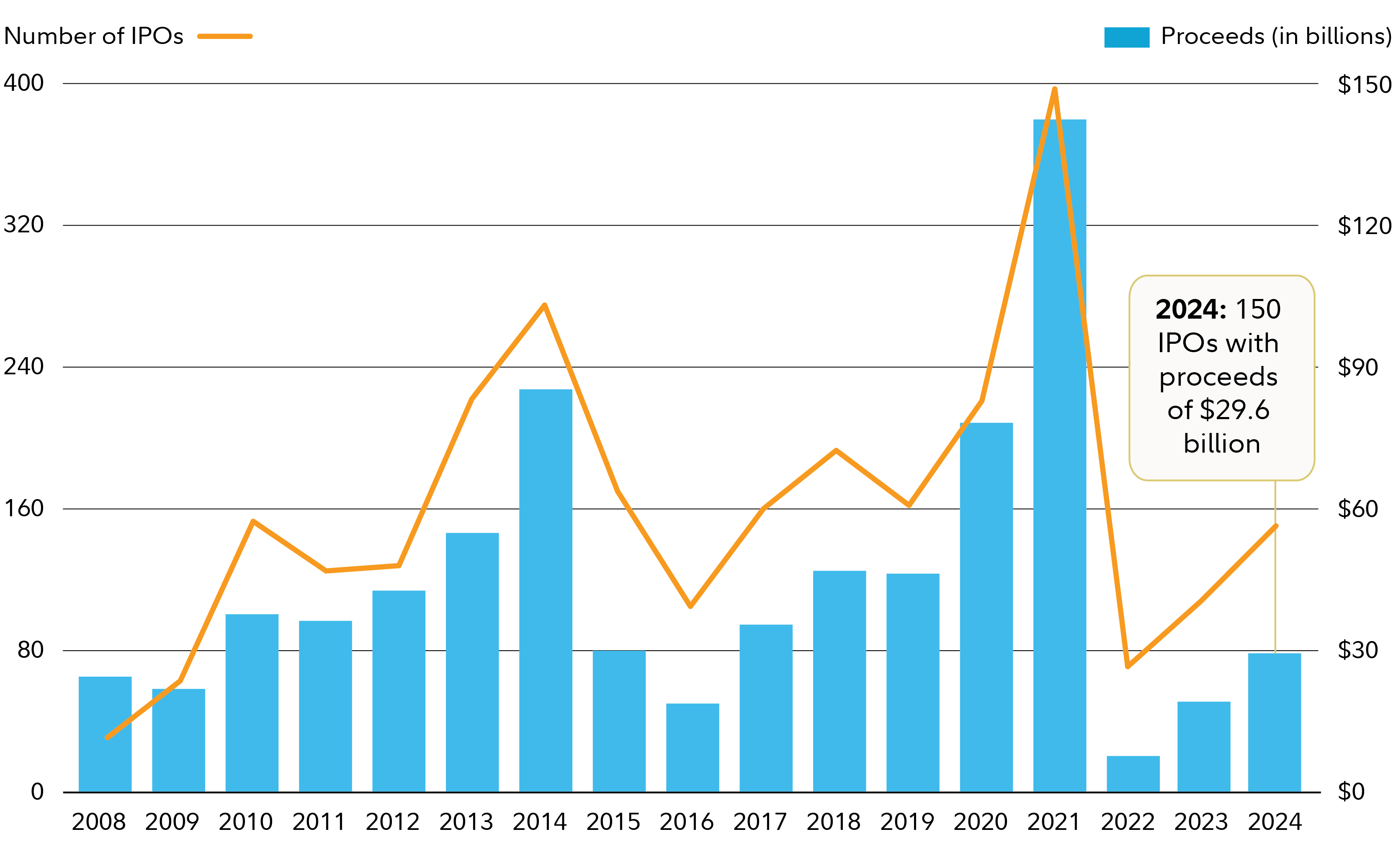IPO activity has been up and down in recent years, but there are signs it could be on the upswing.
2021 was the best year for IPOs since the dot.com era. Then, there was a historic collapse in 2022. But momentum was built in 2023 and 2024, and some analysts think 2025 could be a strong year for IPO activity.
Here's what's happened in the IPO market, plus a look at some of the biggest names that may go public this year.
IPO deals gather more momentum
US stocks gained 23% in 2024 on a price return basis, but IPOs weren't able to match the broad market's performance. The Renaissance IPO Index, which tracks the performance of newly public companies, gained 16% last year.
Nevertheless, IPO activity improved in 2023 and that momentum spilled over into 2024. 150 IPOs closed last year resulting in $29.6 billion in proceeds. While that's relatively slow compared with prior years, it was a more than 50% increase in proceeds compared with 2023 (see US IPO activity chart below).
US IPO activity

The 2024 IPO calendar was relatively in flux. Many IPO dates were pushed back due in large part to rate cuts occurring later than initially expected as well as periodic volatility. But after 2 years of stabilization, some market watchers expect IPO activity to normalize in 2025. This is assuming that economic conditions broadly continue to improve and additional rate cuts occur, among other factors.
IPO activity was led by a diverse lineup of financial, health care, and industrial companies, while many VC-backed tech companies resisted debuting. Some of the largest IPOs by proceeds in 2024 were cold storage REIT Lineage (
Proceed with caution
Is investing in IPOs right for you? Of course, it depends on your investing objectives and risk tolerance. With that said, if you have an interest in IPOs, you should proceed with extreme caution.
IPOs can generate buzz among investors, particularly for so-called "hot issues" that garner a lot of interest. But beware of getting caught up in the hype. IPO investing can be complex and may be suitable only for experienced investors.
There are unique considerations to keep in mind when it comes to investing in IPOs. For example, the stock of an IPO can be particularly unpredictable on its first day—and also in the first few months—of trading.
There is also the issue of access to IPOs. For individuals, getting shares of an IPO at the stated initial offering price may be hard, since the majority of the shares are typically acquired in large blocks in advance by institutional investors. As a result, the closing price after the first day of trading may be a more accurate price at which individual investors may be able to get shares.
Moreover, extracting long-term value out of IPOs, even successful ones, can be tricky for a retail investor. For example, suppose you identify an IPO that you find attractive as a long-term investment, and the price at which it begins trading on the IPO date is $20 (which is by no means a given). If you were to buy the shares at around this price, and by the end of the IPO day the stock price had risen to $30, you might think this is a winning trade.
But take a step back. This means that the company and its underwriters (a financial group, typically a bank that is responsible for determining the market price of an IPO) underestimated demand for the company's stock. Therefore, the company lost out on the opportunity to raise more money to grow its business, because the IPO was mispriced (i.e., instead of receiving, let's say, $30 a share from the public, it will have received only $20 a share). In this scenario, if you were looking for short-term profits, great. If you are a long-term investor, however, a mispriced IPO may not be in your best interest.
Do your homework
IPOs and you
One of the primary difficulties that some investors face when it comes to researching companies that have not yet become public is the extent to which there is access to information. Publicly traded companies in the US, for example, are required by the Securities and Exchange Commission (SEC) to disseminate financial information quarterly. Private companies are not required to do the same (although they do have SEC-mandated disclosure requirements that must be made available to prospective investors in advance of an IPO, a key source of information for an IPO investor being the prospectus).
Perhaps more importantly, individual investors may not have the time or skill needed to evaluate all of the available financial data and to consider the implications to future operating results of the transition from a private to a public company. Consequently, for those investors who do not have access or the skill to analyze all of the financial information necessary to build an informed view of a potential IPO opportunity, it may be hard to fully assess the company's merits as a sound investment.
One way that you might be able to navigate the intricate IPO waters is to consider a managed fund. Most investment management companies have the research capabilities and resources needed to conduct this analysis, which many individual investors are not able to do. And, as always, it is important to build a diversified portfolio, given that one of the risks of IPOs is the stock-specific risk that is present in any concentrated, individual investment.


